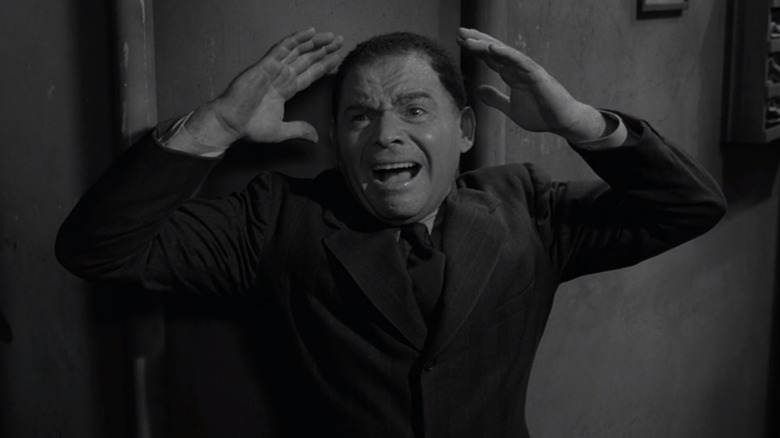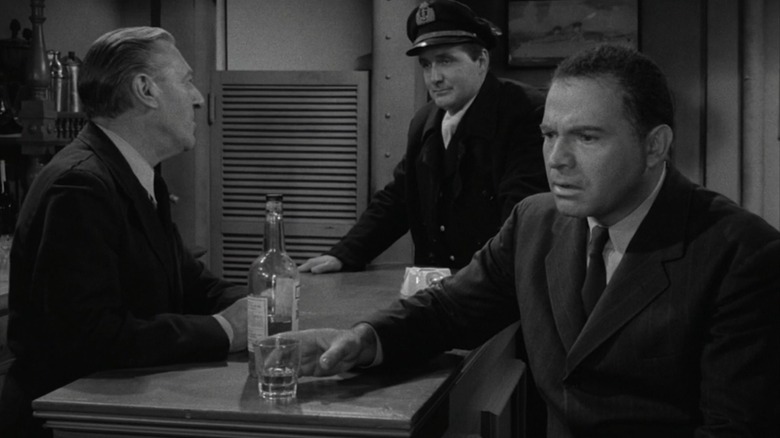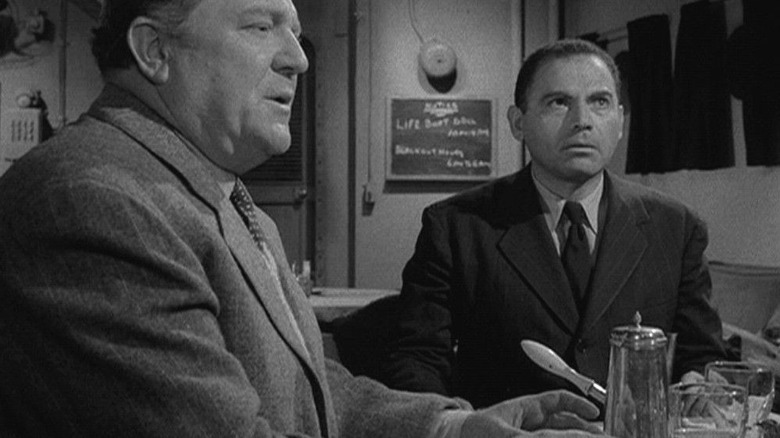The Only Original Twilight Zone Episode Studio Censors Successfully Changed
The tenth episode of "The Twilight Zone" was an episode called "Judgment Night," written by show creator Rod Serling and directed by John Brahm. "Judgment Night" takes place on board a British cargo liner crossing the Atlantic in the year 1942. The main character is an amnesiac named Carl (Nehemiah Persoff) who has no recollection as to how he got on the boat or what his name is. Everyone on board the cargo ship is deathly afraid of Nazi U-boats that may potentially be lurking in the water, and Carl is infected with the premonition that something utterly horrifying is going to happen at 1:15. Curiouser: a cap found in Carl's quarters indicates that he is a member of the Nazi navy. What is going on?
Then a Nazi U-boat does appear in the water next to the cargo ship and blows it up at 1:15, killing everyone on board, including Carl. The twist: Carl is also depicted as being the commander of the U-boat.
As the British ship sinks, Carl and his first officer briefly ponder that their violence was so evil as to be worthy of divine damnation. Perhaps, they figure, they will someday be doomed to live out the pain they caused themselves, perhaps having to live on the British ship at the moment of its destruction. Carl's experience on the ship was, then, a bleak vision of his afterlife.
Marc Scott Zicree's invaluable book "The Twilight Zone Companion" noted that "Judgment Night" is the only instance of a studio censor actually altering the content of a "Twilight Zone" episode. Weirdly, it had nothing to do with the war, the message, or the Nazi characters. The studio was simply concerned that a British character drinking tea would conflict with the show's sponsor, Sanka, a coffee manufacturer.
Orders from the General
There is a scene in "Judgment Night" in which Carl has a conversation with the cargo ship's captain, played by the stalwart Patrick Macnee (who later played John Steed on the long-running spy series "The Avengers"). Being an English man, the captain orders a tea service to the bridge, hoping to enjoy a cuppa on this stressful voyage. "The Twilight Zone," however, was sponsored by General Foods, the parent company of Sanka Coffee, and Sanka ads ran during "Twilight Zone" broadcasts. The corporate overlords were concerned that depicting someone drinking tea would be seen as shilling for a competitor.
General Foods, founded by C.W. Post, got its start in the 1890s manufacturing a product called Postum, a molasses drink that was sold as a coffee alternative. Shortly thereafter, they debuted Grape-Nuts, a barley cereal still on shelves to this day. By 1914, General Foods was so popular that they were able to acquire other food companies, including Jell-O and, more notably, the coffee company Maxwell House. By 1959, when they were sponsoring "The Twilight Zone," General Foods was a titan in the food industry, owning brands like Hostess, Tang, and Kool-Aid.
Curiously, General Foods did manufacture tea as part of the Maxwell house brand. In a 1936 pamphlet on General Foods' production, the following description is found: "Blended only from garden teas, Maxwell House is a choice blend of Pekoe and Orange Pekoe teas."
I suppose when a powerful entity tells you to remove tea references from your terse, British-set WWII morality play, one must step to, no matter how illogical it may be. So Rod Serling capitulated.
Coffee, tea, or censorship?
Ultimately, Macnee's line of dialogue was changed. Rather than ask for tea, he instead requested that the ship's galley send up "a tray." It was, of course, a tray with a teapot on it, but with no explicit references to tea, General Foods was happy. Thank goodness General Foods didn't demand that Serling write some of their own brand names into the script. "Send up a tray of that delicious Maxwell House Coffee" would have been unbearably crass.
Luckily, the company had no objections to the show's content. It was a story about a Nazi officer getting cosmic comeuppance for a war crime, a tale few would object to. It might have helped that the director, Joh Brahm, was born in Germany, but fled in the 1930s when Hitler rose to power. Brahm would ultimately direct 12 episodes of "The Twilight Zone," the most of any single director. Also, Nehemiah Persoff was a Jewish actor born in Jerusalem, and he was certainly not going to make a Nazi commander terribly sympathetic. Ultimately, the audience sees a man hoisted by his own petard.
General Foods had no issues with any of that. It was just a coffee vs. tea debate. The change from "tea" to "tray" was a wise one, as having a British ship commander order coffee would have perhaps strained the bounds of credulity.
In 1990, General Foods was acquired by Kraft Foods. In 2015, Kraft merged with Heinz. That same year, Kraft Heinz merged its coffee division with a Dutch coffee company named Douwe Egberts and formed JDE Peet's, the overseers of the popular coffee chain. In one form or another, that stubborn coffee lives on.


